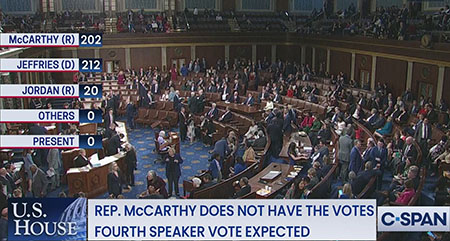by WorldTribune Staff, January 5, 2023
On no! The legislative branch of the U.S. government is paralyzed. Take us to Defcon 4.
CNN warned: “The lack of a new speaker has ground House business to a halt.” The Washington Post blared: “The House itself remained in limbo, with no action until a speaker is elected.”

The New York Times sealed the nation’s fate, proclaiming that the legislative branch “ceases to function.”
After three days and seven votes, there is still no Speaker of the House and Congress can’t act without a speaker.
And that’s a bad thing how?
Prem Thakker of the New Republic wrote: “Some conservatives are even explicitly arguing that Congress’s inability to pick a speaker and conduct the people’s business is good, because, as Representative Tim Burchett, who backs McCarthy, says happily, ‘If we’re not doing anything, we’re not doing anything. So maybe this is a good idea that we’re not being able to do any work.’ ”
For Big Media, even a day without a legislative sessions means Congress is not acting on “another trillion-dollar infrastructure boondoggle to pass. … billions more to give Zelensky. … another Trump investigation to launch … a border to ignore. … an opioid crisis to ignore. … a $33 trillion national debt to ignore,” blogger Don Surber wrote on substack.com.
“This is not the legislative crisis” Big Media is pretending. They’re “fretting over a tempest in a teapot,” investigative journalist Mark Hyman noted in a Jan. 5 substack.com post.
History also shows this is not the crisis Big Media is building it up to be.
It took 133 ballots to elect a speaker in 1856. In 1922, it took 9 ballots.
“As of Wednesday – just the second day of the 118th Congress – 20 Republicans vowed to not vote for Kevin McCarthy. Four years ago, it was 21 Democrats who campaigned on not voting for Nancy Pelosi. Despite several legislative concessions by Pelosi, 12 Democrats did not vote for her as speaker. Pelosi had a larger Democratic majority which allowed her to prevail without that dozen votes,” Hyman noted.
The facts also belie Big Media’s claim that one day – or even a few days of delay – is disastrous.
Since January 2007, the House has met for an average of 158 legislative days each year. The typical working schedule for an American worker with two weeks of annual vacation is 240-250 work days.
“Even the 158 legislative days number is an illusion. Routinely after a holiday, weekend or a legislative recess, the House is gaveled into session at 5 pm on the first day back. This gimmick allows that day to be counted as a legislative day even if the House adjourns for the day just minutes later. Very little, if any, legislative business happens that first day,” Hyman noted.
Meanwhile, 83 percent of House offices (359 of 435) have returning members of Congress and those offices “are presumably fully-staffed and are still opening constituent mail, checking on missing Social Security payments, and mailing Capitol-flown flags. It’s business as usual,” Hyman added.
Hyman concluded: “No, this is not a legislative crisis. It’s a debate over policy differences among Republicans. For the record, actual debate is something that has been missing from the House chamber for several years now (under both parties).”
“The Simpsons” had it spot on in 1994:
Action . . . . Intelligence . . . . Publish
